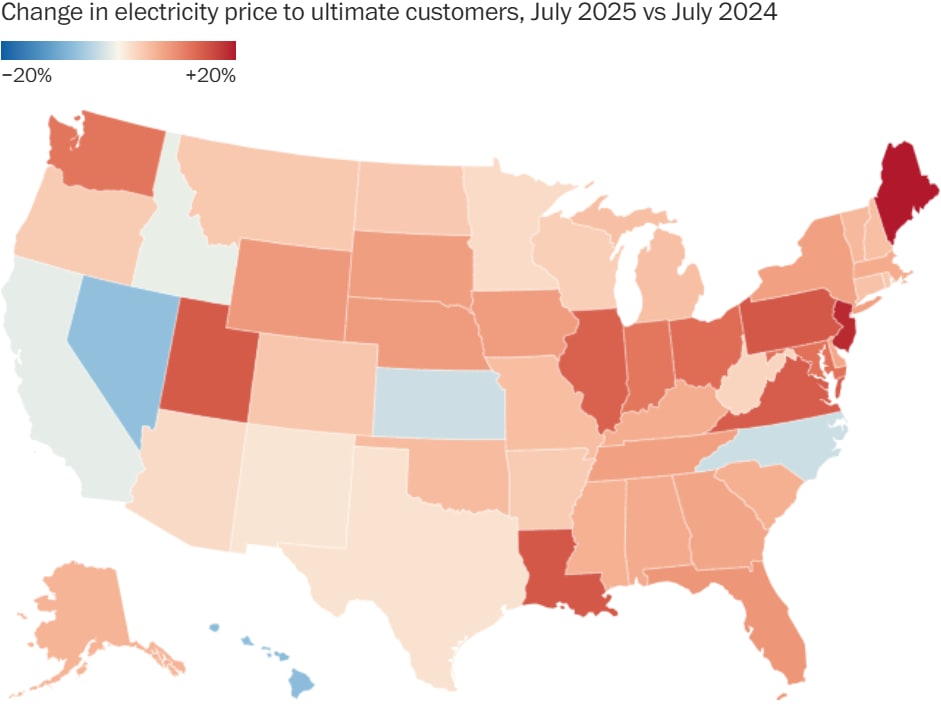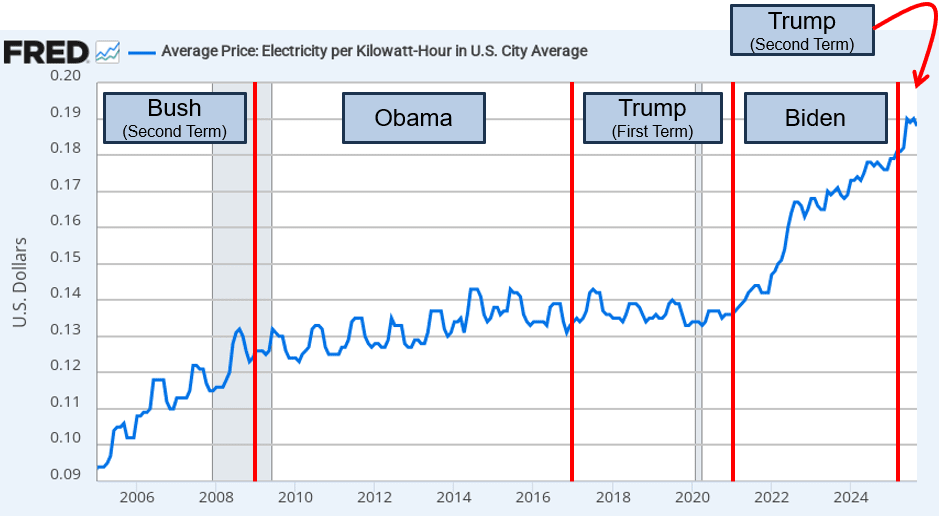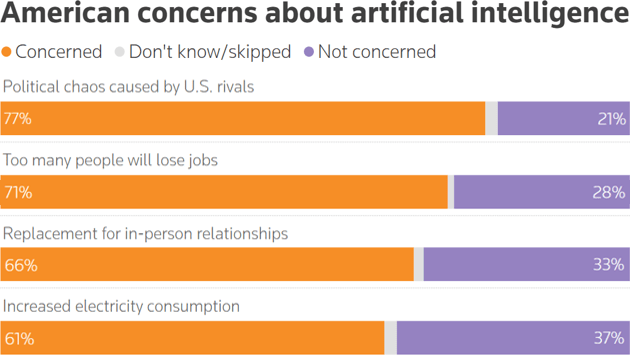|
How Democrats can win (Part 3)
Republican policies—and Republican allies—are increasing our electricity costs.
A few things that are true right now:
Cost of living is consistently one of the most important issues for voters.¹
Since last year, electricity bills are up almost everywhere in the United States.
AI is inescapably in the news, and Big Tech is seen as Trump’s strong ally.²
The AI and crypto industries are driving up electricity costs because of how much power they’re consuming, and their consumption is only going to increase.
Americans see AI as a culprit for rising energy costs.
The One Big Beautiful Bill Act (OBBBA), the Republican-led law that passed earlier this year, will lead to higher household electricity costs.³
In short: we have an administration whose policies are driving up the cost of energy, and whose allies in AI and crypto are accelerating those increases even further.
All of that is an opportunity for Democrats—and a chance to reframe public opinion on clean energy investment.
Article summary:
Republican policies, both laws and tariffs, are driving up the cost of electricity.
Another reason energy costs are going up: AI and crypto companies consume huge amounts of energy, just as Republicans are cozying up to both industries.
Democrats should claim energy affordability as an issue—and reshape the narrative around renewable energy, since climate change alone has never been a political winner.
Energy costs are up (almost) everywhere since last year
I noted in my last article that voters trust Republicans more than Democrats on pocketbook issues, which is a huge part of the reason that Trump was elected in ’24.
So it’s notable that in the last year, electricity prices are increasing twice as fast as inflation. They’re up almost everywhere in the country, something that will only accelerate as the policies of the OBBBA go live.⁴
 |
All of this is happening despite the fact that energy prices were a stronger issue for Republicans than Democrats in the last election.⁵ It was an effective talking point in ’24 because energy costs did go up considerably during the Biden years,⁶ after having been reasonably flat through the Obama and first Trump presidencies.
 |
I think it’s important to note: I steadfastly disagree with the Republican talking point that investments in renewable energy are why electricity costs went up. After all, energy prices spiked everywhere in the world after Biden was elected, not just in the United States. Much more of this has to do with Russia’s invasion of Ukraine, OPEC price collusion, and lingering post-COVID supply chain issues.
I’m all for Democrats throwing Biden under the bus, and I don’t think he’ll be remembered as a good president. He did things I would’ve done differently. But the correct response to rising energy prices during the Biden years is not to disinvest in renewables like nuclear, wind, and solar.
In any event, Biden isn’t around to blame anymore, and public opinion has duly moved: 44% of Americans trust Democrats on energy issues vs. 43% who trust Republicans, a statistical tie.⁷
Energy costs, in all likelihood, will continue to go up. And while I’m not cheering for that—one-in-six American households struggle to pay their energy bills—it creates a potential wedge issue for Democrats.
Americans don’t trust crypto and worry about AI
More on the details of Republican policies in a moment, but a significant driver of increased energy costs: AI and crypto companies, both of whom are fast becoming some of the Republican Party’s most unwavering allies and donors.
Before we talk about the impact that AI and crypto companies have on energy consumption, it’s worth noting that Americans are extremely skeptical of both industries.
58% of Americans say that “AI could risk the future of humankind,” which isn’t exactly suggestive of an electorate that’s excited to double down on artificial intelligence. Overwhelming majorities are concerned that AI will lead to chaos, job losses, and yes, higher energy costs.⁸
 |
There’s similar intense skepticism around crypto: only 5% of Americans are extremely or very confident that cryptocurrencies are reliable and safe; 63% say that they’re not.⁹
I bring this up as a way to say that Americans aren’t inclined to trust companies in either industry. Both industries are very young, but when it comes to energy consumption, they’re already huge market movers:
Increases in energy prices are higher in the places closest to data centers.
Data centers and other commercial customers are on track to consume more electricity than households by the end of 2026,¹⁰ an all-time first. By 2028, data centers could consume as much as 12% of the electricity in the U.S.
In early 2024, as much as 2.3% of U.S. electricity consumption was going towards mining cryptocurrencies.¹¹
Over the next five years, data centers will drive almost half of the country’s growth in electricity demand.
As I’ve said before, I am not anti-AI, and I think the industry has enormous potential. But looking through this lens, AI is a fast-growing crisis.¹²
Data centers, AI, and crypto have booming needs for energy—and all of that is happening right at the same time that federal legislation is cutting energy production.
The disastrous policies of OBBBA, the Republican tax bill
On top of changes to energy consumption and energy prices from crypto and AI, the other major change: Republican policies will almost certainly lead to higher electricity prices and higher utility bills.
I won’t get into the weeds of everything, but in short: by sunsetting a lot of federal support for investments in new sources of energy, we’re reducing the overall supply of energy, which will drive up the cost of electricity—especially with demand growing so substantially.
The consensus is that electricity bills will go up because of the OBBBA, though by how much is a matter of debate. Estimates I’ve seen for increases to annual household energy costs range from $78 on the low end to $540 on the high end. Either way, to state the obvious: this will not be popular.
And that’s before we get to tariffs. Tariffs aren’t part of the OBBBA legislation, because Trump unilaterally imposed them. But tariffs will have a huge impact on energy costs too, and that’s not just for renewables. Below is an analysis from Vinson & Elkins, one of the country’s leading energy-focused law firms. (Emphasis added.)
The increased cost of steel and aluminum will impact virtually every part of the energy sector including electricity, renewable energy, pipelines, and oil and gas exploration and production companies. These increased costs will undoubtedly be passed to U.S. energy consumers in some form and due to the long useful lives of energy assets, may impact energy prices for decades.
Democrats need to capitalize on this—especially given that Americans already believe the OBBBA will have a negative impact on the country.
Reframing the renewable energy debate
The climate crisis is becoming more acute,¹³ but climate was hardly mentioned in the ’24 elections, after having been a marquee issue in 2020. That was responsive to how voters were feeling: the issue was less important to American voters in 2024 than it was four years prior.
The partisan divide on climate change has grown, and Republicans have been effective in convincing voters that investments in renewable energy lead to higher energy costs.
But that’s just not true. And Republicans are giving Democrats a chance to reframe the issue of investing in renewable energy as a question of affordability, not a question of addressing climate change.¹⁴
“Drill, baby, drill” isn’t lowering anyone’s energy costs
A few things are coming together to create a political opportunity:
OBBBA isn’t popular and will lead to higher electricity bills.¹⁵
AI and crypto companies are driving up the cost of energy, right at the same time that executives across both industries are cozying up and/or kowtowing to the Trump administration. Both industries are immensely unpopular and distrusted.
Young voters see addressing climate change as a top-five priority and as the top foreign policy issue. As I’ve written about extensively, Democrats need to find ways to win back young voters, and this is one path.
We need to produce more energy; Republicans are against that. Crypto and AI are consuming vast amounts of energy; Republicans are cozying up to their lobbyists and donors. Electricity bills are becoming unaffordable; Republican tariffs are making those bills more expensive than ever.
Republicans might blame Biden, but he’s old and gone. The blame falls in the lap of a Republican government, something Democrats would do well to remind voters.
Feel free to share this post with someone who will find this interesting. If you’re reading this email because someone sent it to you, please consider subscribing.
In this particular poll, the top issue is “government corruption.” Why Trump’s brazen corruption doesn’t move voters more, I’ll never quite understand. Trump is literally directing the federal government to pay him $230 million, which is some of the most obvious self-dealing I can even hypothetically imagine.
This is a notable departure from how Americans viewed Big Tech companies just a year ago, when Americans thought they were too left-leaning. But when basically every large tech CEO is palling around with Trump and funding White House renovations, it’s hard to argue that Big Tech is “too liberal” anymore.
Energy is a bit more complicated than other industries, but the same basic economics holds true: if you cut supply and increase demand, prices will go up.
It’s no surprise that energy costs have become major issues in next week’s gubernatorial races in New Jersey and in Virginia. (Also a campaign issue in New Jersey: profound antisemitism from the campaign of Republican nominee Jack Ciattarelli.)
Strictly speaking, and this refers back to “gas prices,” which is not exactly the same thing but a very close proxy.
Clearly, Republicans felt like this was a strong issue for them. Everything from drilling permits to vehicle electrification to environmental justice to the Inflation Reduction Act were lines of attack for Republicans in the last election.
Some nuance here: the cost of electricity per kilowatt-hour doesn’t move in lockstep with energy bills for any number of reasons, including the fact that a lot of household utilities consume less energy than their equivalents in the past. Nonetheless, it’s clear that Americans were paying more in utilities.
To be very precise here: this survey asks about “trust on energy,” which isn’t exactly the same thing as energy affordability. There’s probably some small subset of Democrats, for instance, who genuinely care more about addressing climate change than affordability. (As I’ve noted, those two things are not in conflict with one another.) Nonetheless, this does point to the fact that public opinion is, slowly, shifting away from Republicans on this issue.
Again, to be very precise, the question is about energy consumption, not energy prices. But I don’t think people really care about energy consumption per se; I think they care about the impact that consumption will have on their energy bills.
When it comes to the Trump administration’s involvement with crypto, that’s driven by his corruption and push for self-enrichment, not any responsiveness to voters.
The data in question is on p. 46, if you want to really get your hands dirty in government data.
ChatGPT to the rescue with a definition of what it means to mine cryptocurrencies, if this is helpful: “Mining crypto means using computers to help run and secure a digital money system. That means checking and recording transactions so no one cheats or spends the same coins twice. In return for doing that work, miners can earn new coins or small fees — it’s a way people make money by keeping the system running.”
Anyway, I suspect the number is even higher now amidst this latest crypto boom, but I couldn’t find more recent reliable data.
I’ve outlined a few key challenges, but they go much deeper—noise complaints and water consumption, for instance, are also huge issues. The conflicts here are really just beginning.
This data comes from climate.gov, which was shut down by the federal government in June. But some existing webpages remain active.
Not for nothing: investments in renewable energy don’t just keep the costs of energy down. Those investments also reduce the volatility of household electric bills and allow faster recovery after natural disasters.
Trump, ever the showman and marketing-minded president, hasn’t changed his tune on the issue of energy costs.